Search
Top » Bands and Artists » R » REO Speedwagon » Timeline
Timeline:
1971: "REO Speedwagon" Released

During that initial recording session in Bridgeport, the band wrote one of their most popular and enduring concert songs, "157 Riverside Avenue," which they still use as an encore today.
To finance their trip and pay for expenses, the band earned $100 making a commercial for "Night Fighter," a zit cream.
NOTE: This album was never issued in CD format in the United States. In 1991, Sony Music Products released a CD in their European market, only. Bootlegs abound on the internet, including a bogus record label called "Federalist" supposedly based out of Canada. The individual who bootlegs this CD converted a scratched up old LP into a CDR, and it's an incredibly poor quality recording. Don't get ripped off!
1972: "REO T.W.O" Released
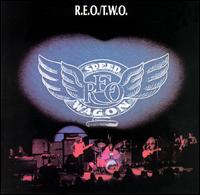
Cronin was an unemployed musician in Chicago, and was running a scam "musician's referral service" to attract potential gigs. Richrath called him up looking for a lead singer, and Cronin naturally recommended himself.
REO/T.W.O. was quickly recorded at a 16 track studio in Nashville, Tennessee, while the band stayed at the same hotel as the Rolling Stones when they came through town.
Most of the songs on this album were Gary's, including the classic "Golden Country." Says Richrath, "Champaign was a hip town, and I couldn't help but be dragged into a political awareness. It was protest time. I remember sitting in the student union at about 8 o'clock in the morning -- feeling totally burnt and fried at the point where I was bummed with the whole world. I looked up and these people were rushing in promoting a lettuce boycott, and for some reason that got me politically motivated. I saw the light. I ran home at about 9 or 10 o'clock in the morning. There was a Newsweek sitting on the top of the piano and I just started playing. I looked up again and one of the Newsweek stories was entitled Golden Country. It was an article about the war. I started writing.. ."
1973: "Ridin' the Storm Out" Released

Singer Mike Murphy, who had fronted the popular Champaign band, One-Eyed Jacks, climbed on-board. Cronin's image was air-brushed out of the album cover and replaced by Murphy. The song "Ridin' the Storm Out," with Murphy's vocals, was the first REO song to hit the charts, weighing in at #174.
1974: "Lost In A Dream" Released
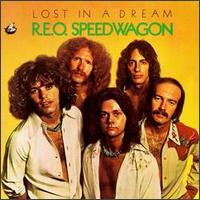
This album also marked the debut of songwriter Bruce Hall, who co-wrote the title track with Murphy. Hall would subsequently join the band after the departure of bassist Gregg Philbin in 1977.
The album also featured Gary Richrath on vocals, where he sang "Wild As the Western Wind."
1975: "This Time We Mean It" Released
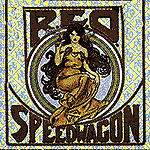
REO's tour manager, Alan Green, tracks down Cronin in a little bar in Chicago where he is singing for his supper, dressed in hush puppies and cordoroy pants. Cronin jumps at the chance to re-join the band, and flies to LA the next day. After rehearsing for about a week, the band hits the road again.
1976: "REO" Released

Band members credit the album cover as well as production by John Stronach as contributing factors to poor album sales. Undetered by commercial failure, REO's songwriting is as strong as ever, and this album remains one of the band's favorites. It features co-writing credits by both Richrath and Cronin on the songs "Breakaway" and "Ligntning." However, Richrath and his guitar steal the spotlight in the instrumental tune "Flyin' Turkey Trot," a predecessor of the "Unidentified Flyin' Tuna Trot."
1977: "Live: You Get What You Play For" Released

Steve Cowart, a filmaker REO would meet up with in the future during 1985's Live Aid, was filming a Blue Oyster Cult show back in '77. Second on the bill was REO Speedwagon. While watching the first band, Kevin Cronin asked Cowart for an honest opinion about what he thought about the band. Cowart reluctantly said that they were "Okay, but..." as he searched for the most tactful way to appease REO's lead singer without pissing him off.
Cowart told Cronin he'd heard all of REO's albums up to that point, but didn't own any. Finally Cronin said "...inconsistent... our albums up to that point have been inconsistent." Relieved by Cronin's honesty, Cowart replied "Yeah, that pretty well hits the nail on the head." Cronin told him, "Well, in two weeks we are releasing a new album called YOU GET WHAT YOU PLAY FOR and tonight's show is gonna blow you away!" He was right, and it became the band's first platinium-selling release.
This album, primarily produced by the band, was the first to capture REO's energy before a live audience. Sixteen Cronin and Richrath songs were performed at Busch Stadium in St. Louis, setting an all-time attendance record that surpassed the Beatles. The album features a run-through of REO's greatest hits, highlighting the creativity of the band's dynamic songwriting team.
When the album was transferred into CD format by Sony, REO's cover of Chuck Berry's "Little Queenie" was cut as well as "Gary's Guitar Solo."
1978: "You Can Tune A Piano But You Can't Tuna Fish" Released
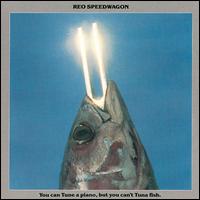
The title for the album comes from a line in an old Marx Brother's movie that was suggested by one of the band's friends at a party. Epic loved the idea and hired an artist to design an album jacket cover of a fish with a tuning fork. The cover itself is an actual un-retouched photo that was shot in the desert around Joshua Tree. To obtain the "perfect" lighting, it was shot at sunrise on a cold winter morning.
1979: "Nine Lives" Released
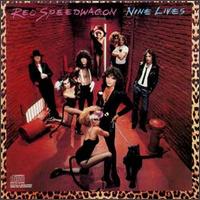
During the Nine Lives tour, the band struggled for audiences on both coasts, but remembered Richrath's motto of "Only the Strong Survive." Finding a home in the midwest, REO played to a crowd of 35,000 at Kansas City's Royals Stadium that summer. When lightning flashed across the sky and the thunder rolled in, the band played on. They keenly remembered a day back in Peoria in 1971....
1980: "A Decade of Rock and Roll 1970 to 1980"

Buyer Beware: The CD version differs from what was recorded on the 2 LP set. Cronin's scat on "157 Riverside Avenue" -- a 12 1/2 minute jam -- was politically corrected to delete references to Cronin describing himself on a date with a "big ol' glass of my favorite wine in one hand, smokin' a big ol' jay in the other -- people I was feeling GOOD!"
The telephone conversation between Kevin and Gary was also edited, which omitted the "Let that telephone ring" part of Cronin's scat.
Other quirks: On the audiocassette version, there's no break between the first six songs on Side Two, which makes using the search feature on a car tape player virtually impossible.
1981: "Live Infidelity" Video Released
More Information...1981: "Hi Infidelity" Released
More Information...1982: "Good Trouble" Released
More Information...1985: "Best Foot Forward" Released
More Information...1985: "Wheels Are Tourin'" Video Released
More Information...1988: "The Hits" Released
More Information...1991: "The Second Decade of Rock and Roll 1981 to 1991" Released
More Information...1991: "Keep On Loving You - Best" Released
More Information...1991: "Video Anthology 1978 - 1990" Video Released
More Information...1993: "Star Box" Released
More Information...1995: "Subway in Tokyo" Released
More Information...1995: "Believe In Rock And Roll" Released
More Information...1995: "High Infidelity Gold" Released
More Information...1996: "Building The Bridge" Released
More Information...1998: "Only The Strong Survive" Released
More Information...1998: "Premium Best" Released
More Information...1999: "The Ballads" Released
More Information...2000: "Styx And REO Speedwagon Arch Allies Live At Riverport" Video Released
More Information...2001: "Time Flies Anthology" Released
More Information...2001: "Arch Allies: Live at Riverport Disc 2" Released
More Information...2001: "Simply The Best" Released
More Information...2001: "Take It On The Run" Released
More Information...2001: "Arch Allies: Live At Riverport Disc 1" Released
More Information...2001: "Extended Versions: The Encore Collections" Released
More Information...2001: "Live Plus 3" Video Released
More Information...2001: "Live Plus" Released
More Information...2001: "Live - Plus" Video Released
More Information...2002: "Keep On Rollin'" Released
More Information...2002: "Real Artists Working" Video Released
More Information...2003: "The Essential REO" Released